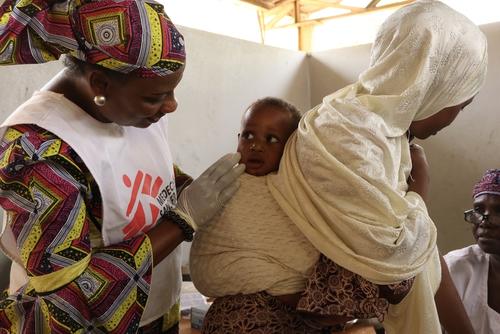Médecins Sans Frontières (MSF) has deployed several emergency teams in Niger in order to contain the meningitis C outbreak that has been affecting many regions of the country since March. Working closely with the Ministry of Public Health, MSF teams have vaccinated more than 358,800 people in the most affected areas. At the same time, MSF is continuing to monitor at-risk areas, and is providing medical care for those affected by the disease.
Between 1 January and 7 May, there were 179 deaths from meningitis out of a total of 3,037 recorded cases. The majority of cases occurred in the west of the country. Meningococcal meningitis is a bacterial disease that causes serious infection of the membranes around the brain and spinal cord. In response to the outbreak, which was declared by the Ministry of Public Health at the end of March, MSF supported the health authorities with a vaccination campaign, targeting the regions of Niamey, Tillabéry, Dosso and Tahoua.
Niger is part of the ‘meningitis belt’ – a region that stretches across sub-Saharan Africa from Senegal to Ethiopia. Niger, like 25 other countries in the region, is regularly affected by this disease. Cases of meningitis C have been on the rise for several years, first in Nigeria in 2013 and 2014, and in Niger since 2015. So far, the number of meningitis cases recorded across Niger has almost doubled compared to 2016 during the same period. Sixty-five per cent have been verified cases of meningitis C, the main strain of this epidemic, and 18 per cent verified as strain X.

More than 358,800 people between two and 20 years of age were vaccinated in the 24 health areas that had reached alert or epidemic thresholds. In order to implement the vaccination campaign in the areas affected by meningitis, 341,000 vaccine doses were provided by the International Coordinating Group (ICG) on vaccine provision. The rest of the vaccines were supplied by the Ministry of Public Health.
“As with the meningitis outbreaks of previous years, we have responded to the emergency in areas where the population has been the most affected. Our teams have supported the Ministry of Public Health in managing the vaccination campaign in several districts of the town of Niamey, and also in the regions of Tillabéry, Dosso and Tahoua where more than 75 per cent of cases have been recorded,” explains Félix Kouassi, Head of Mission for MSF in Niger. “Vaccination plays a vital role in coping with the burden of this disease. That is why it is important that manufacturers are able to guarantee a sufficient global quantity of vaccinations and at an affordable price.”
Since the beginning of the year, MSF has been working with the Ministry of Public Health to rapidly treat meningitis patients and monitor areas at high risk. This has been done in parallel with the vaccination response. MSF supported three hospitals and 24 health centres in the regions of Niamey, Dosso, Tillabéry and Tahoua by providing them with supplies such as drugs, rapid diagnostic tests, laboratory kits, lumbar puncture needles, syringes and even mattresses.
MSF is continuing to monitor the areas at risk and provide support in managing cases. Emergency teams are also ready should the Ministry of Public Health need support for a new vaccination campaign.
MSF has been present in Niger since 1985 and currently works in the regions of Maradi, Tahoua, Zinder and Diffa, providing paediatric and neonatology care, treatment for malnourished children under five years of age, immunisations, reproductive healthcare and support in the fight against malaria. In 2015 and 2016, MSF teams supported the Nigerien Ministry of Health’s response to the meningitis epidemic in the regions of Niamey, Zinder, Tahoua, Tillabéry and Dosso. During the 2016 epidemic, there were 1,538 cases of meningitis and 114 deaths reported between January and June.


